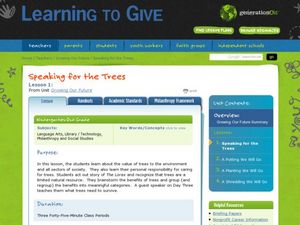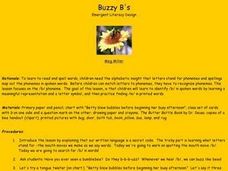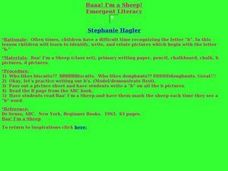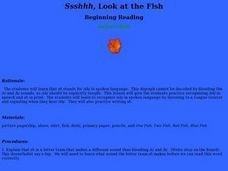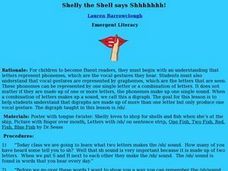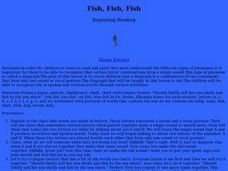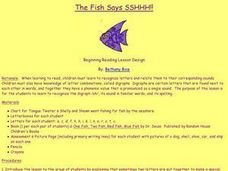Curated OER
Yes or No?
In this evaluating whether illustrations go with their sentences worksheet, students read the sentences, view the pictures, and determine if they match with yes or no answers.
Curated OER
Speaking for the Trees
Students present a play based on The Lorax.In this environmental issues lesson plan, students read and discuss literature and complete activities pertaining to environmental stewardship.
Curated OER
We Like to Imagine - Animals
Students describe a pretend animal. They read "The After School Monster." Students read other books and discuss whether or not the characters are real. Students make a drawing of a pretend animal and of a real animal. They make up a...
Curated OER
Getting to Know You
Students explore ways in which they are smart. In this "getting to know you" classroom team building lesson plan, students discuss various ways people can be smart and describe ways in which they are smart. Students listen to "Smart"...
Curated OER
Popcorn PPPPopping P
Young scholars are introduced to the most popular phonemes to help them with their reading. As a class, they listen to popcorn popping and identify the sound being heard. They practice saying different tongue twisters and drawing the...
Curated OER
Once Upon a Thank You
Students are encouraged to revisit their favorite books and recall just what it was about the author who wrote each book or the characters they created that made the story so special. They then celebrate their chosen authors and/or...
Curated OER
The Lorax
Third graders, while working in groups, identify five sets of words that rhyme in order to write and illustrate a storybook using rhyming words through a journal entry. They assess proper grammar, spelling, and punctuation in their...
Curated OER
Books for Teaching about Cultural Diversity Through Celebrations
Learn about different holidays, including Christmas, Hanukkah, Kwanzaa, La Posada, by listening to stories. After reading about each holiday, they participate in a discussion and complete a fun activity.
Curated OER
Cat Word Find
Kindergarteners find the word "cat," hidden 26 times in a word search. This worksheet has a reference web site for additional activities.
Curated OER
Backwards Day
Learners create ways to do things backwards. In this cross-curriculum lesson, students participate in various backwards activities for an entire day. Learners recite the alphabet backwards, spell their names backwards, and read stories...
Curated OER
Buzzy B's
Students identify /b/ in spoken words and recognize the letter symbol b in written words. They say a tongue twister which contains words with /b/. They then listen the the book "The Butter Battle Book" by Dr. Suess and identify the...
Curated OER
Doc Says Open Up
Students recognize the short /o/ sound in spoken words in this lesson. They say a tongue twister with words emphasizing the short /o/ sound. They then listen the the book "Hop on Pop" by Dr. Suess, and identify the words they hear...
Curated OER
Baaa! I'm a Sheep!
Young scholars study the letter "B,b" and compare it to the letter "D,d." They practice writing the letter before completing a picture identification worksheet. Next they listen to the B page from the Dr. Suess ABC book and read "Baa!...
Curated OER
Crying Students
Students recognize the phoneme for the short vowel a in written and spoken language. Through a variety of activities, they discriminate the short vowel /a/ from other phonemes. Students associate the phoneme with its letter...
Curated OER
Tick Tock Goes The Clock
Young scholars practice letter recognition in written language and sounds for /t/ in both the upper and lower case forms. They utilize a chart with "Today Teddy talked to ten people at two o'clock," on it while making the sounds that are...
Curated OER
Pop Your P's
Students identify the letter and phoneme /p/ in written and spoken language. Students practice the production of the /p/ sound through songs and tongue twisters. They identify the initial placement of the letter and sound using a picture...
Curated OER
Ssshhh, Look at the Fish
Learn that "sh" stands for /sh/ in spoken language. This digraph cannot be decoded by blending the /s/ and /h/ sounds, so /sh/ should be explicitly taught. This lesson gives the young scholars practice recognizing /sh/ in speech and...
Curated OER
Shelly the Shell
First graders identify the digraph /sh/ in written and spoken language. Students practice the production of the /sh/ sound through word practice and stories. They identify the initial and final placement of the new digraph /sh/ using a...
Curated OER
Open Up and Say /o/
Students recognize the short vowel o in written and spoken language. Through matching and listening activities, they discriminate the vowel sound /o/ from other phonemes. Students identify the phoneme and letter in words and pictures.
Curated OER
Fish Wish
Students identify the digraph /sh/ in written and spoken language. After a reading of a decodable story containing the digraph, students practice identifying the initial and final placement of the new digraph /sh/ in words using a...
Curated OER
Say aahhh....said the doctor
Students recognize the short vowel O in written and spoken language. Through matching activities, they discriminate the short vowel /o/ from other vowel sounds. Students associate the phoneme with its letter representation and identify...
Curated OER
Shhhhh
First graders identify the digraph /sh/ in written and spoken language. After a brief discussion of the independent and combined sounds of the phonemes /s/ and /h/ students practice identifying initial and final placement of the new...
Curated OER
Fish, Fish, Fish
Young scholars identify the digraph /sh/ in written and spoken language. After a brief discussion the independent and combined sounds of the phonemes /s/ and /h/ students practice identifying initial and final placement of the new...
Curated OER
The Fish Says SSHHH!!
First graders identify the digraph /sh/ in written and spoken language. After a brief discussion the independent and combined sounds of the phonemes /s/ and /h/ students practice identifying initial and final placement of the new digraph...



